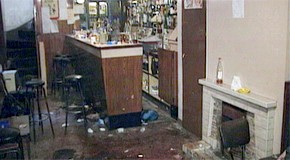Il Police Ombudsman ha rimandato la pubblicazione del rapporto sulla strage di Loughinisland del 1994, su richiesta delle famiglie delle vittime

I parenti delle vittime hanno sempre parlato di collusione con le forze di sicurezza e sperano che il rapporto del Police Ombudsman, già ritardato diverse volte, potrà fornire risposte.
I risultati dell’indagine dovevano essere rilasciati questa settimana, ma la pubblicazione avverrà a giugno.
La mossa giunge dopo colloqui tra il Police Ombudsman e le famiglie, che non sarebbero contente di alcuni contenuti del rapporto.
“La dichiarazione pubblica del Police Ombudsman sull’indagine riguardante le circostanze che concorrono al l’attacco terrorista del 1994 al The Heights Bar di Loughinisland, in cui sei persone furono assassinate, è stata rimandata”, si legge in una dichiarazione di lunedì.
“Le famiglie delle vittime e dei feriti nell’attacco hanno chiesto che i risultati non siano pubblicati questa settimana. Avendo ascoltato le loro motivazioni, il Police Ombudsman ha accordato un ritardo di alcune settimane”.
Il rapporto lungamente atteso su Loughinisland era pronto originariamente per il 2008.
Questo è stato mandato indietro in modo che potessero avere luogo delle revisioni, dopo che nuove informazioni sono state presentate, sostenendo che ulteriori controlli sul rapporto andavano eseguiti.
L’anno scorso, un file è stato inviato al PPS per valutare se sporgere denuncia contro un agente di polizia coinvolto nel caso, con l’accusa di aver aiutato gli uomini armati.
L’accusa non è andata avanti, perché c’erano “prove insufficienti” per ottenere una condanna.
Dettagli dei risultati iniziali del Police Ombudsman, ottenuti da Utv, hanno mostrato che ci sono state importanti carenze nel corso dell’inchiesta iniziale, comprese le affermazioni secondo cui non erano stati fatti abbastanza sforzi per identificare gli assassini, che la polizia non aveva parlato con gente ritenuta interessante e che prove chiave erano state distrutte.
Tratto da Utv
New delay for Loughinisland report
The Police Ombudsman has postponed the publication of a report into the 1994 Loughinisland shootings, at the request of the families of those killed.
Their relatives claim there was security force collusion and hope a report from the Police Ombudsman, which has seen a number of delays, will provide answers.
The findings of the investigation were due to be released this week, however that has now been put off until June.
The move comes after talks between the Ombudsman and the families, who are understood to be unhappy with some of the content of the report.
“The Police Ombudsman’s Public Statement on its investigation into circumstances surrounding the 1994 terrorist attack on The Heights Bar in Loughinisland, in which si, people were killed, has been postponed,” a press release said on Monday.
“The families of those killed and those injured in the attack had asked that the findings not be published this week. Having listened to their views, the Police Ombudsman has agreed to a delay of several weeks.”
The long-awaited Loughinisland report was originally ready for publication in 2008.
That was pushed back so that reviews could take place after new information came forward, amid claims that further checks on the report needed to be conducted.
Last year, a file was sent to the PPS to consider whether to press charges against a police officer involved in the case, who was alleged to have helped the gunmen.
The prosecution did not go ahead, after there was found to be “insufficient evidence” to support a conviction.
Details of the initial findings of the Ombudsman, which were obtained by UTV, showed there were considered to be major failings in the original investigation, including claims that enough effort was not made to identity the killers, that police failed to speak to people of interest, and that key forensic evidence was destroyed.